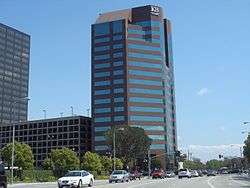KB Home
 | |
| Public | |
| Traded as | NYSE: KBH |
| Industry | Homebuilding |
| Founded | 1957 |
| Founder | Donald Kaufman and Eli Broad |
| Headquarters | Westwood, Los Angeles, California, United States of America |
Key people |
Jeffrey T. Mezger (CEO)[1] |
| Revenue | US$2.40 billion (2014)[2] |
| US$918.3 million (2014)[3] | |
| Total assets | US$4.76 billion (2014)[4] |
| Total equity | US$1.60 billion (2014)[5] |

KB Home is a homebuilding company based in the United States, founded in 1957 as Kaufman & Broad in Detroit, Michigan. It was the first company to be traded on the NYSE as a home builder and was a Fortune 500 company from 2000 through 2008. Its headquarters are in Los Angeles, California.
The company has built 550,000 homes since its founding. It builds homes primarily for first-time home buyers.
History
KB Home was founded in Detroit in 1957 by Donald Kaufman and Eli Broad. The company expanded to Arizona in 1962 and into California in 1963 and was the first U.S. homebuilder to expand into France in 1967. It completed an initial public offering in 1986, and from that time was known as Kaufman and Broad Home Corporation until 2001 when its name was shortened to KB Home.
The company has periodically acquired other homebuilders as the company expanded into new markets. These purchases included New Mexico-based Opnel Jenkins in 1995, San Antonio-based Rayco Homes in 1996, Upland, California-based Colony Homes in 2003. It also maintained a division in France, which was sold in 2007.
As part of a promotion, in 1997 the company built a life-sized replica of The Simpsons cartoon home in Henderson, Nevada. It has since engaged in homebuilding promotions with Martha Stewart (2005), Disney (2008) and the Ellen DeGeneres Show (2012).
In 2001 KB Home was sued when homeowners in a subdivision in Arlington, Texas discovered that their homes were built on top of a practice bombing range from the 1940s and 50s which the military had cleared for development. That suit has since been settled. The Army Corps of Engineers was engaged in remediation.[6]
In November 2006, KB Home president, CEO, and chairman Bruce Karatz resigned after an internal accounting probe into his alleged backdating of stock options. KB Home also announced the resignation of its head of human resources, Gary A. Ray, and the resignation of its chief legal officer, Richard B. Hirst. The company determined that Karatz and Ray had picked grant dates under the company's stock option plans. According to the Wall Street Journal, Karatz was one of the most highly paid executives in 2005, earning almost $156 million, primarily from options.[7]
Karatz was succeeded by Jeffrey T. Mezger as CEO.[8]
The company was named "Most Admired Homebuilder" by Fortune Magazine in 2006, 2008, 2009, and 2011.
KB Home was ranked #1 Overall Green Builder by Calvert Investments in 2010.[9]
In fiscal 2012, the company delivered 6,282 homes in the United States and had revenue of over $1.5 billion. This revenue figure is down from 2005 (at the height of the real estate boom), when the company delivered close to 40,000 homes and had more than $9 billion in revenue.
GreenHouse
KB Home launched the company's first net-zero-energy home in January 2011. The GreenHouse was designed by KB Home and Martha Stewart and was featured as the "Idea Home" at the International Builders Show that year.[10] The house is located in Windermere, FL.[11]
ZeroHouse 2.0
The successor to the GreenHouse is the ZeroHouse 2.0, which combines energy efficiency measures and solar panels to achieve net-zero energy usage.[12] Introduced in 2011, the first model ZeroHouse 2.0 was built in Tampa, FL, closely followed by models in San Antonio and Austin, TX.[12]
KB Homes expanded the ZeroHouse 2.0 to the Mid-Atlantic states in June 2012 with the unveiling of the first of its kind in Waldorf, Maryland. The 4,000-square-foot model home project was completed with the installation of a 40-panel SunPower system by Solar Energy World.[13]
Notes
- ↑ "Management". KB Home. Retrieved 26 September 2012.
- ↑ http://investor.kbhome.com/releasedetail.cfm?ReleaseID=891006
- ↑ http://investor.kbhome.com/releasedetail.cfm?ReleaseID=891006
- ↑ http://investor.kbhome.com/releasedetail.cfm?ReleaseID=891006
- ↑ http://investor.kbhome.com/releasedetail.cfm?ReleaseID=891006
- ↑ ?Harris, Byron (March 1, 2005). "Home builder dispute intensifies". WFAA-TV.
- ↑ "KB Home CEO Bruce Karatz Out Amidst Stock Options Review". Fox News. November 13, 2006.
- ↑ KB Home CEO resigns after backdating probe - MarketWatch
- ↑ "A Survey of Sustainable Practices by the Homebuilding Industry" (PDF). Calvert Investments. November 2010.
- ↑ Koch, Wendy (January 12, 2011). "Martha Stewart Goes Green with KB Home Project". USA Today.
- ↑ Defendorf, Richard. "KB Home GreenHouse and Martha Stewart Styling Share the Spotlight at IBS". Green Building Advisor from the Taunton Press, Inc.
- 1 2 Defendorf, Richard (September 20, 2011). "KB Home's ZeroHouse 2.0". The Taunton Press.
- ↑ Dobson, Amy Rose (July 5, 2012). "A New "ZeroHouse" in Waldorf, Maryland". Curbed. Retrieved 6 July 2012.